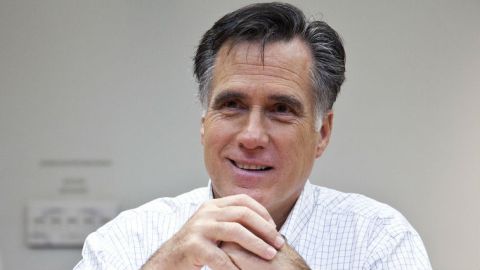Can Conservatives Elect a Non-Romney?

Mitt Romney is an out of touch multimillionaire flip-flopper with a pink slip fetish who is full of pious baloney. That sentence is basically an amalgamation of the various attacks on Mitt Romney by his Republican rivals in the last week. In breaking Ronald Reagan’s “Eleventh Commandment” (“Thou shalt not speak ill of any fellow Republicans”), Romney’s rivals are now road testing the same attacks voters will likely hear from Barack Obama.
These attacks are taking their toll, as Romney’s lead in the polls started to erode after a weekend of aggressive gang-tackling from Gingrich, Santorum, Perry and Huntsman. Bring it on, Romney said defiantly. A candidate in this race needs “broad shoulders” and the ability to “stand the heat.” After all, “this ain’t beanbag,” Romney said.
Perhaps it’s advantageous for Republicans to test their presumptive nominee against attacks right now in order to build up some political antibodies for what will be a brutal general election. Indeed, Romney has reason to be grateful that he still has so many rivals left to kick him around. After all, the reason Romney finished first in the Iowa Caucus and is in a strong position for today’s New Hampshire primary is that a crowded field of competitors has effectively divided the anti-Romney vote.
One way conservatives are hoping to address this dynamic is to unite behind a single consensus alternative to Romney. A group of influential evangelical leaders is planning to meet in Texas with the hope of accomplishing just that. Yet it is unclear if conservative voters will simply fall in line with this group’s endorsement. After all, there is no Republican party chieftain or figurehead powerful enough to sway the race. It is also unclear whether a marginal candidate like Rick Perry, who still has campaign money burning a hole in his pocket, will step aside in the interest of conservative unity. As long as Perry sticks around it will work to Romney’s favor.
However, the knock against Romney’s win in Iowa was that despite campaigning there for the last four years and spending millions of dollars, he still failed to crack 25 percent of the vote. In other words, the glass was three-quarters empty. He did not emerge as a strong candidate, critics charge, but rather as the strongest minority candidate. While Romney is likely to outperform his Iowa showing in New Hampshire, South Carolina and Florida, it is less likely the results will portend a unified party.
That is why many Republicans fear a potentially long and acrid primary process in which Romney will emerge victorious but with a big bloody nose and a depleted war chest. Just consider the scorched earth campaign that Newt Gingrich has already launched against Romney in South Carolina. Gingrich’s PAC will drop a $3.4 million ad bomb there that will feature testimonials from people who lost their jobs to the predatory capitalism of Romney’s investment firm Bain Capital. Pat Buchanan warns the Republican bloodletting could “call to mind the last scene of Hamlet, the dead and dying everywhere, but no Fortinbras to restore order in the house.” The Republican Party, meanwhile, will have squandered an opportunity to nominate a “true conservative” and end up instead with a flawed and weakened candidate who failed to win support from the majority of the party.
The conservative conundrum regarding the Romney candidacy is the result of our plurality voting system that isn’t flexible enough to accurately measure voter preferences. While this system is adequate for a head-to-head race, it is deeply problematic when there are multiple candidates. That is to say, if the majority of Republicans in fact want a non-Romney candidate but they can’t come to a consensus on who that candidate is, shouldn’t there be mechanisms in the voting system that could help bring about that outcome?
A number of potential fixes have been proposed, but one particularly intriguing idea is called Approval Voting. Approval Voting allows voters to select multiple candidates. In other words, if you are a very conservative voter who has problems with Romney, you would be able to vote your approval for say, Gingrich, Perry and Santorum. The candidate with the highest level of voter approval is the winner.
There are many advantages to this system of voting. The Center for Election Science, an organization that studies group decision-making, lists them as follows:
The Center for Election Science argues this system of voting is the most fair one for voters and candidates alike. One of the original proponents of Approval Voting is NYU political science professor Stephen Brams.
Watch Bram explain how Approval Voting works here:
What’s the Significance?
The idea of Approval Voting gained traction after the 2000 Presidential election in which Ralph Nader played spoiler to Al Gore. While the center-left candidates won a majority of votes, George W. Bush won the election. Here is what an Approval Voting ballot would have looked like for that election:
Follow Daniel Honan on Twitter @Daniel Honan





